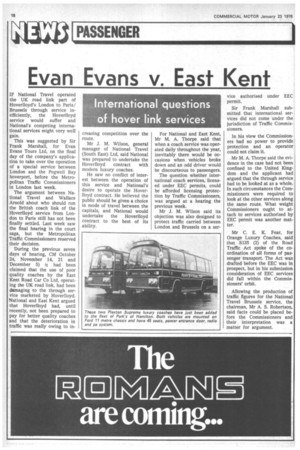Evan Evans v. East Kent
Page 20

If you've noticed an error in this article please click here to report it so we can fix it.
International questions of hover link services
IF National Travel operated the UK road link part of HoverBoyd's London to Paris/ Brussels through service inefficiently, the Hoverlloyd service would suffer and National's competing international services might very well gain.
This was suggested by Sir Frank Marshall, for Evan Evans Tours Ltd, on the final day of the company's application to take over the operation of a special service between London and the Pegwell Bay hoverport, before the Metropolitan Traffic Commissioners in London last week.
The argument between National Travel and Wallace Arnold about who should run the British coach link of the Hoverlloyd service from London to Paris still has not been finally settled. Last week saw the final hearing in the court saga, but the Metropolitan Traffic Commissioners reserved their decision.
During the previous seven days of hearing, CM October 24, November 14, 21 and December 5) it had been claimed that the use of poor quality coaches by the East Kent Road Car Co Ltd, operating the UK road link, had been damaging to the through service marketed by Hoverlloyd. National and East Kent argued that Hoverlloyd had, until recently, not been prepared to pay for better quality coaches and that the deterioration in traffic was really owing to in creasing competition over the route.
Mr J. M. Wilson, general manager of National Travel (South East) Ltd, said National was prepared to undertake the Hoverlloyd contract with modern luxury coaches.
He saw no conflict of interest between the operation of this service and National's desire to operate the Hoverlloyd contract. He believed the public should be given a choice in mode of travel between the capitals, and National would undertake the Hoverlloyd contract to the best of its ability. For National and East Kent, Mr M. A. Thorpe said that when a coach service was operated daily throughout the year, inevitably there would be occasions when vehicles broke down and an odd driver would be discourteous to passengers.
The question whether international coach services, licensed under EEC permits, could be afforded licensing protection by Traffic Commissioners, was argued at a hearing the previous week.
Mr J. M. Wilson said its objection was also designed to protect traffic carried between London and Brussels on a ser vice authorised under EEC permit.
Sir Frank Marshall submitted that international services did not come under the jurisdiction of Traffic Commissioners.
In his view the Commissioners had no power to provide• protection and an operator could not claim it.
Mr M. A. Thorpe said the evidence in the case had not been confined to the United Kingdom and the applicant had argued that the through service had to be looked at as a whole. In such circumstances the Commissioners were required to look at the other services along the same route. What weight Commissioners ought to attach to services authorised by EEC permit was another matter.
Mr C. E. K. Fear, for Orange Luxury Coaches, said that S135 (2) of the Road Traffic Act spoke of the coordination of all forms of passenger transport. The Act was drafted before the EEC was in prospect, but in his submission consideration of EEC services did fall within the Commissioners' orbit.
Allowing the production of traffic figures for the National Travel Brussels service, the chairman, Mr A. S. Robertson, said facts could be placed before the Commissioners and their interpretation was a matter for argument.
















































































